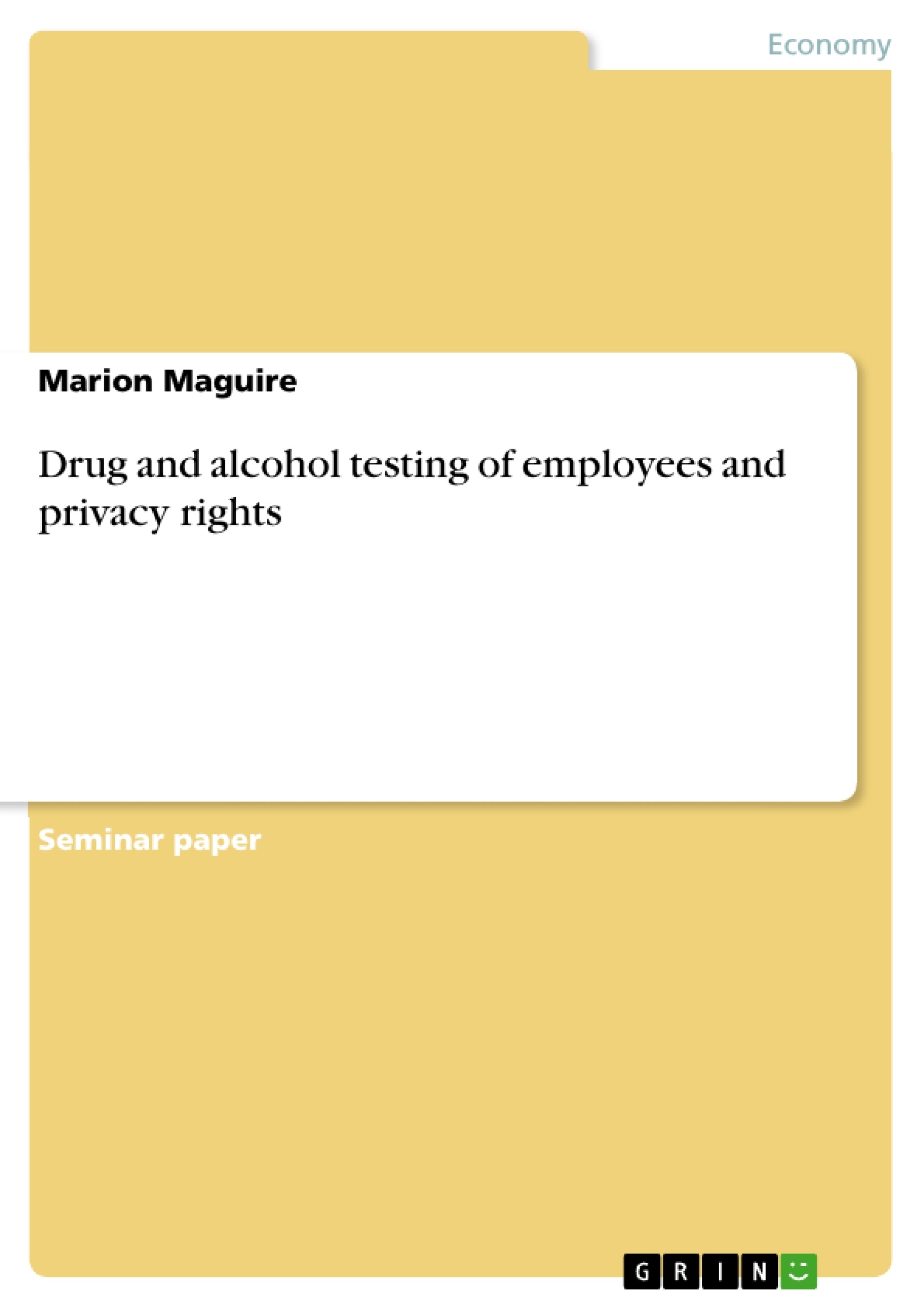Employee privacy is increasingly becoming an issue for employers, unions, employees and lawyers. Employer requirements to conduct tests and acquire additional information from employees, such as drug and alcohol use and testing has become a privacy concern. While increasingly employers have to ensure that their employees are fit for duty, the use of drug and alcohol testing is still controversial. With respect to drug and alcohol testing, some states prohibit such tests but state law varies dramatically.
A study shows that America′s drug problem is big. America, with 5% of the entire world′s population buys and consumes fully 60% of the entire world′s supply of illegal drugs and 77% of all illegal drug users are employed. Ostensibly, prospective employers and employees want the same thing: to match the best person with the most fitting job. Many employers are quick to welcome outside evaluations of an individual′s mental and physical fitness and integrity, and to believe in their results - often at the risk of sacrificing individual privacy rights. The issue here is, should employers require their employees to be alcohol and drug tested and how does it affect privacy rights. In general, under human rights law, drug and alcohol testing are only allowed in certain circumstances. It is discriminatory to test potential or existing employees for drug and alcohol use if there is not a valid reason to test.
The alternatives employers have are either drug test job applicants and existing employees or do not drug test them. There are pros and cons regarding alcohol and drug testing that need to be considered before deciding which alternative to chose. Criteria that is used in this research paper are basically violation of privacy rights and security and safety concerns.
Inhaltsverzeichnis (Table of Contents)
- CHAPTER I. INTRODUCTION
- Purpose and Importance of the study
- Statement of the problem
- Alternatives and Criteria
- Limitations
- CHAPTER II. Theoretical or Practical Foundation
- Introduction
- Theoretical or practical basis
- CHAPTER III. RESOLUTION PROCESS
- Introduction
- Data
- Location of the data
- CHAPTER IV. ANALYSIS
- Introduction
- Analysis of the alternatives
- CHAPTER V. CONCLUSION AND RECOMMENDATION
Zielsetzung und Themenschwerpunkte (Objectives and Key Themes)
This research paper examines the ethical and legal implications of drug and alcohol testing in the workplace. The study aims to analyze the arguments for and against such testing, considering both the employer's need for a safe and productive work environment and the employee's right to privacy. The paper explores the legal framework surrounding drug testing in the United States, highlighting the differences between private and public sector employees.
- Employee privacy rights
- Employer's right to a safe and productive workplace
- Legal framework of drug testing
- Differences in drug testing regulations for private and public sector employees
- Ethical considerations surrounding drug testing
Zusammenfassung der Kapitel (Chapter Summaries)
Chapter I introduces the study's purpose and scope, focusing on the growing concern regarding employee privacy in the context of drug and alcohol testing. It defines the problem of balancing employer needs for workplace safety with employee privacy rights and outlines the study's methodology and limitations. Chapter II explores the theoretical and practical foundations of the research, discussing the right to privacy and its application in the workplace, particularly for public and private sector employees. It examines the legal framework surrounding drug testing and how it intersects with the Fourth Amendment to the US Constitution, highlighting the need for justification for drug testing in public sector employment. Chapter III provides an overview of the research process, outlining the data sources and methods used in the study. Chapter IV analyzes the alternatives available to employers regarding drug testing, weighing the pros and cons of testing job applicants and existing employees. The chapter explores the criteria used to evaluate the different options, primarily focusing on privacy violation and safety concerns.
Schlüsselwörter (Keywords)
The study focuses on the key topics of employee privacy, drug and alcohol testing, workplace safety, legal regulations, constitutional rights, and the distinction between private and public sector employment. The research explores the practical application of legal frameworks and ethical considerations surrounding the use of drug testing as a tool for maintaining a safe and productive workplace. The research also considers the implications of drug testing for both employers and employees, highlighting the potential for both benefits and drawbacks.
Frequently Asked Questions
Are employers allowed to drug test their employees?
In general, drug testing is allowed only in certain circumstances, such as for safety-sensitive positions. Laws vary significantly between states and between the public and private sectors.
How do drug tests affect employee privacy rights?
Drug testing is seen by many as an intrusion into personal privacy. It raises ethical questions about whether an employer has the right to monitor an employee's behavior outside of work hours.
What is the difference between public and private sector drug testing?
Public sector employees are protected by the Fourth Amendment against unreasonable searches, meaning the government needs a stronger justification for testing than private employers do.
Why do employers implement drug and alcohol testing?
Employers primarily implement testing to ensure workplace safety, increase productivity, reduce liability, and ensure that employees are fit for duty.
What are the alternatives to mandatory drug testing?
Alternatives include performance-based testing, employee assistance programs (EAPs), and focusing on observable behavior rather than biological samples.
- Quote paper
- Marion Maguire (Author), 2003, Drug and alcohol testing of employees and privacy rights, Munich, GRIN Verlag, https://www.grin.com/document/20213



